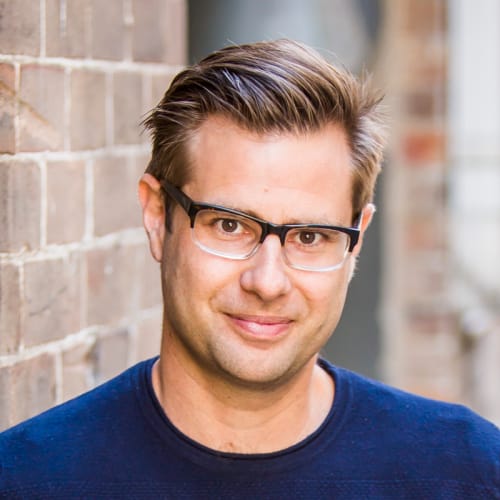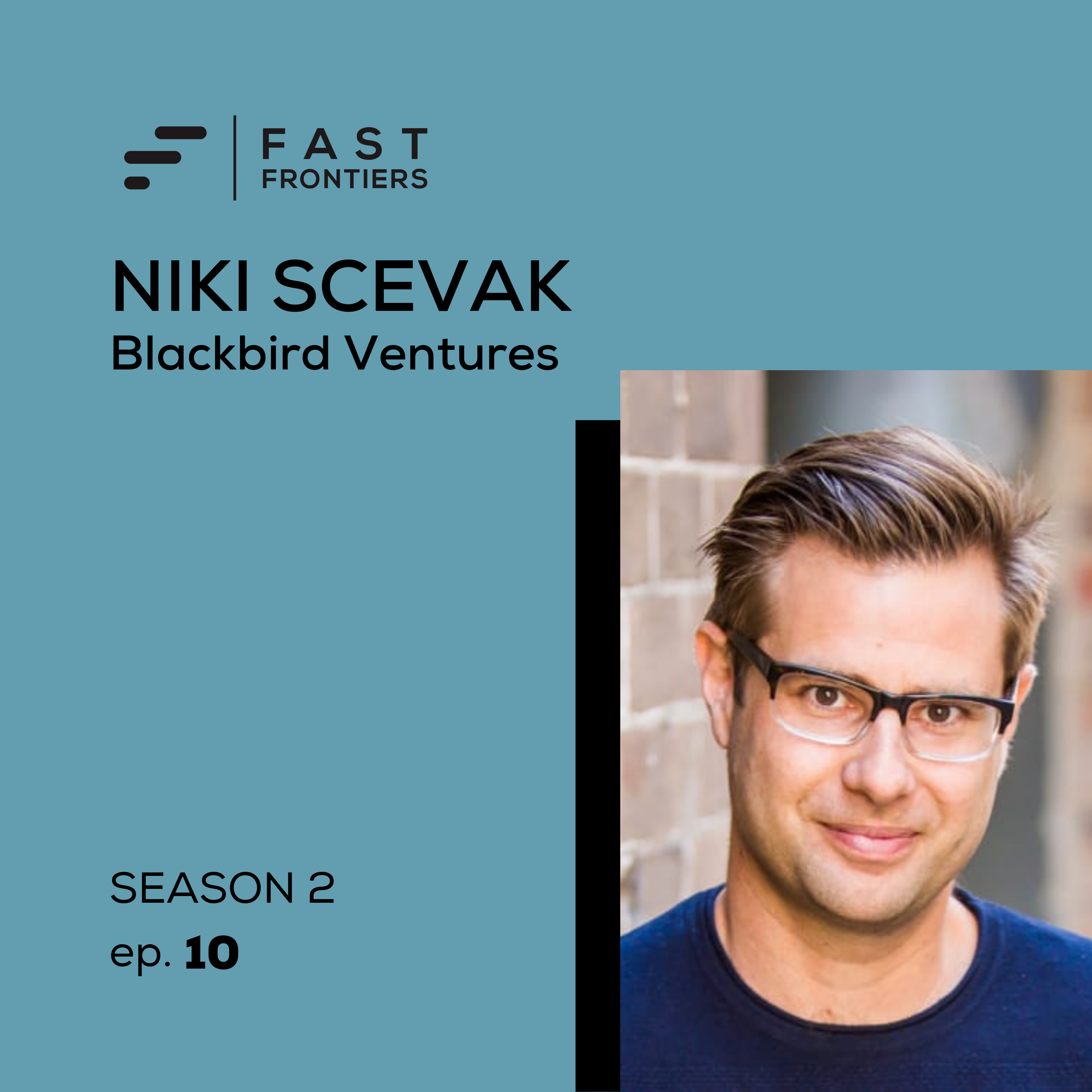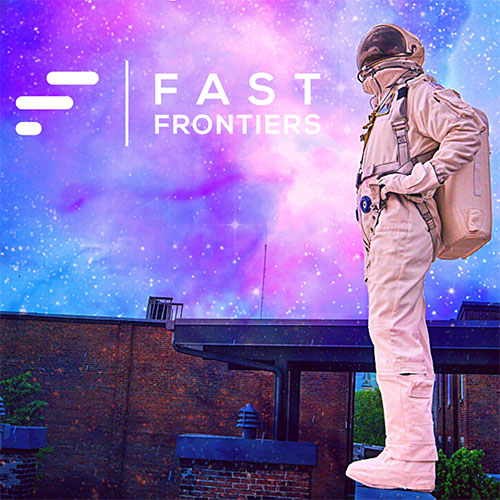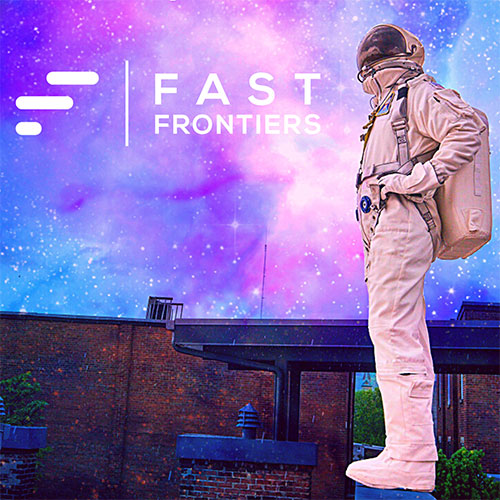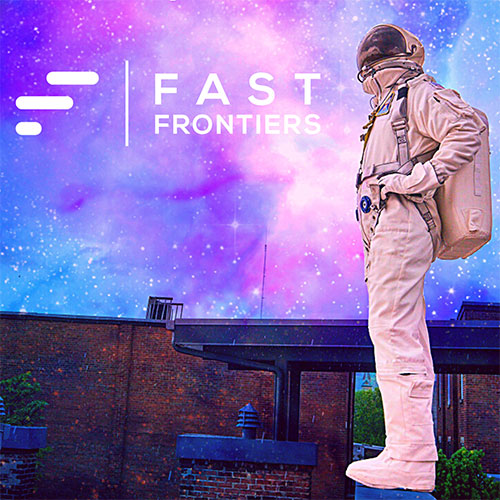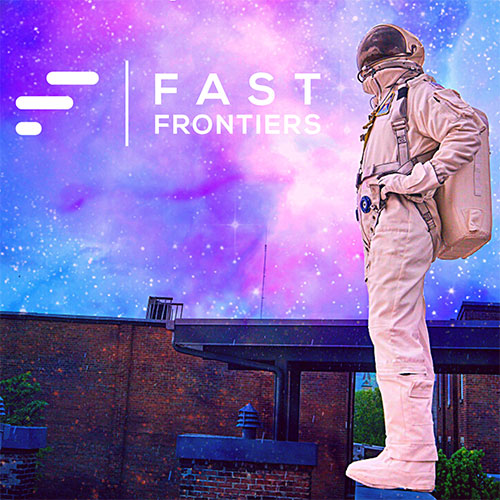S2 Ep 10. Niki Scevak: Blackbird Ventures
- 0.5
- 1
- 1.25
- 1.5
- 1.75
- 2
Tim Schigel: Welcome to Fast Frontiers. I am your host, Tim Schigel, managing partner of Refinery Ventures. In today's episode, we're bringing you my conversation with Niki Scevak, co-founder and partner of Blackbird Ventures in Melbourne, Australia. In today's episode, we're going to talk about the Australian tech ecosystem, which was virtually nonexistent in 2010, when Niki and his co-founder Rick Baker started raising Blackbird fund number one. And now today they have over $1.3 billion under management across four funds. Blackbird's investing thesis is that they value the relationship with the company first and often start by investing early before product and revenue and follow the company through every round of venture financing. The biggest theme or so what I hope you take away from this conversation is this, instead of seeing their Time Zone as a limitation, they turned it into a strength. This is a great concept that other regions can learn from. Niki Scevak is the co-founder and partner of Blackbird Ventures. After moving back to Sydney in 2010, Niki founded Startmate, one of Australia's preeminent incubators. Before investing, he also started two software companies and lived in New York City. Blackbird is a leading venture firm in Australia and New Zealand and has invested in companies like graphic design platform, Canva, and autonomous vehicle company, Zoox. Please enjoy my conversation with Niki Scevak. Welcome Niki.
Niki Scevak: Thank you for having me.
Tim Schigel: So glad that you're providing your leadership at Blackbird for Australia. It's really impressive what's happened since 2012 when you started it. But yeah, let's talk a little bit more about your background on how your entrepreneurial journey transpired and led you to Blackbird.
Niki Scevak: Yeah. I was doing university in the late '90s and reading lists, as remember publications like the Red Herring or Business 2.0, and really, I think through that sort of caught the bug for technology, entrepreneurship and technology investing. I did a startup while at university. The most famous thing about the startup was that it was with Mike Cannon-Brookes who is the co-founder of Atlassian. He and I were doing the same university degree and were actually roommates. It was, I think the real education that I got. We raised a tiny amount of money. We built the company over a year or year-and-a-half. It was called The Bookmark Box, that allowed people to manage and share their bookmarks online. If you remember back then people had different computers at home and work and school, and so on. Really, I think provided the entre to my career and to say that this is what I want to do with my life. Then after The Bookmark Box was sold to a company in New York, I moved over to New York then sort of the next phase of my career was with a research and advisory company called Jupiter and spent five years in New York and also had done a startup in New York. Moved back to Australia around the end of 2009, get married, have kids. And really what struck me when moving back was all of the people that I had gotten to know in New York and San Francisco and the founders who were building companies over there. And what struck me when I moved back to Australia, that the people I was meeting here were just as talented, just as qualified or unqualified to do companies and that sort of led me to found originally Startmate, which is an accelerator and built with the same principles as Blackbird, which is a founder community at the heart of it, of founders helping other founders. And this focus on a particular type of company that can be built from Australia, but built with customers all around the world from day one. So I think entrepreneurship outside of the U.S. is roughly divided into two categories. One is, which I think was prevalent early on in, in sort of the history, was take a good idea and make it work in Australia. Groupon works in America, and make it work in Australia. Uber works in America. Make it work in Australia. And so that sort of translation entrepreneurship community, they built valuable companies. People made money investing in them. But what was really interesting to me was not that set of entrepreneurship, but the emerging group of people that were trying to build companies that were the best in the world, not the best in Australia. And had been very close to the journey of Atlassian and observing that from afar. And then there were 20 or 30 other Australian companies, Campaign Monitor Aconex, Halfbrick Studios, Wise Tech. The list goes on of these great companies that were built from Australia that had customers all around the world and really was that group of people that we've built Blackbird and Startmate for and with some amount of capital. But as I said, the essential ingredient of community, where if you look at the magic of Silicon Valley, it really is when someone builds a technology company, they go on to invest and help the next generation. And so if, in this state of play, back in 2010, in Australia, where there was no capital, but there was also no community. Those who had succeeded in building technology companies had largely not reengaged or recycled their time and money in the next generation. And I think the biggest thing that we did was we assembled some capital but we assembled that community of technology founders who had a passion to help the next generation. And that has really been the central ingredient to the progress we've made over the last decade.
Tim Schigel: Well, congrats on that. I mean, everything about your message is about being ambitious and leading the world, which I think is terrific and is also unique because I think too many people want to just, as you mentioned, just kind of reproduce something else. And one of the things that makes Silicon Valley unique is that people go there, if they're not already there, with the mindset that they're there to change the world, right? And it's very hard to replicate that in other places around the world. And you seem to be doing that, or at least you're resonating with entrepreneurs who want to do that. And I wonder how much of that you found already existed and you're just kind of giving a voice to it or how much of it is helping to educate and inspire those entrepreneurs.
NIki Scevak: So I think of ambition as a honeypot. And I should say that I also think that ambitious companies are more likely to succeed than unambitious companies. And this whole idea of a honeypot of, if you have a grand mission, the best people want to join you to do their best work, the best investors would like to invest in you at the best valuations. The best partners will say yes quickly and not screw around and give you the best terms. And so there's something sort of self-fulfilling or something that is like a chemical reaction in ambition. And I think people building a company is so hard. Whether you build an ambitious company or an unambitious company, it is all low probability that you will succeed. But I think, so if you're going to do something, do something worthwhile and if you do something worthwhile, actually I think you have a slightly higher chance of success than if you're unambitious. So how you build an ecosystem, I think is you have these lighthouse companies that then go on to inspire the next generation and the employees that grew up in those lighthouse companies go on to be the early employees or the founders of those next generation companies, the angel investors, or the group of people that help the next generation as I mentioned. And so how you build an ecosystem, a series of lighthouse companies hopefully lead to a whole lot more in the next generation. Usually, it's like a seven-year kind of cycle. And then those next generation companies would hopefully lead to exponentially more companies in the third generation and so on and so forth. Then all of a sudden you have an ecosystem. So I think if you have a 20 year view, it's a fairly straightforward exercise.
Tim Schigel: There are a number of topics I want to follow up on, on that, but the first, so our listeners understand, can you go ahead and walk us through A, just the history and the growth of Blackbird since 2012 and also name some of your higher profile companies that people might be aware of?
Niki Scevak: Yes. We have raised four funds at Blackbird. The first was a $29 million fund and this is Australian dollars, which periodically sort of one-to-one with the U.S. dollar, but actually at the moment, a sort of 70 cents the U.S. dollar, so slightly less for listeners in America. So that first one was a $29 million vehicle. We had 522 meetings to get 97 people to say yes, over a two year period. We opened the doors after one year with our first close and kept fundraising for another year after that for the first one. So it was an extremely difficult fundraise and really back then, it was to do with people didn't believe in Australian startups. There had been a prior generation of Australian venture capital funds that hadn't really delivered the returns that investors had expected and so there was no capital left in the ecosystem. As I said, there were successful companies. This was the paradox. There were all of these already successful companies in Australia, but no one really paying attention to them. And so it was controversial or contrarian to raise an Australian venture capital fund. I think the sort of accepted wisdom was the best Australian VC, was Accel. Accel, Silicon Valley fund had invested in, I think, sort of five or six of the best Australian technology companies in that era, including Atlassian. Accepted wisdom was that there wasn't any room for a local fund. With the 97 people who said, yes, most of them were the technology founders who were putting in their own personal capital. So again, that essential ingredient of Blackbird and really the heart of Blackbird is this founder community, firstly through the LPs of that first fund then now through the portfolio of companies, we've been fortunate enough to invest in. So we got started with the $29 million fund. Second fund was 192. Third fund 260. And then the most recent fund is a $600 million. So I can describe how that has changed over time. Rewinding back to the first fund, the flip side of it being a really hard fundraise, is that once we had raised the fund, we were the cup of water in the desert. We were the person who was interested in these kinds of software companies that were building themselves from Australia, but had customers all around the world and so we were fortunate enough to be invested in the first. And now every round of companies like Canva and Culture app and SafetyCulture and Zoox, and there's a whole bunch of wonderful companies in that first fund. Big ambition change for Blackbird came in that second fund. So we raised our second fund in 2015. The sort of rise in ambition for ourselves, was why should we invest in the first round and not any other rounds in the company? Why is the venture capital industry structured around the rounds of financing rather than structured around the company? So the units of the venture capital industry is the financing round. You raise a seed fund to invest in seed rounds. You raise a growth fund to invest in growth rounds and it's segmented along these financings. But I think anyone who has invested in companies realizes that the unit is not the financing round, it's the relationship with the company. And people say venture capitalism is a palpable business, which means that the most valuable company will be worth more than every other company combined in that portfolio or that year of mintage, of venture capital. And so with our second, third and fourth funds, we also have this larger pool of follow-on fund, the capital that invests in the existing portfolio. So it's a pool of capital that is a window into our latest stage deal flow. And what that has meant is we invest right at the beginning before product and before revenue, but we can invest all through a company's life and success and particularly for those generational companies, to be able to invest 100s of millions of dollars or even billions of dollars per company. The case study example there is Canva, which is a graphic design platform. We first invested $250,000 in Canvas' seed round as it was getting started and before product, but we've invested$ 200 million just into Canva. So the strategy is slightly different to the way that the venture capital ecosystem is structured in the U. S., but it really recognizes that this power-law distribution, why don't people adjust their behavior? Why do people invest before they know a company's successful and then invest nothing after they know a company is successful? That logic has never made sense to me and so we have adjusted our investing in recognition that the industry is around relationships, not rounds of financing. And there is no better place to start the relationship than right at the beginning, at the entry point and it is the first investment in the seed round. But then if you go and build a great relationship, that is ultimately the best competitive advantage that will out-compete, if you want to invest in those later rounds of the companies, out-compete all of the iconic names of Silicon Valley and so on. And so great relationships will out-compete great brands and that's how we've been able to build out our business in Blackbird.
Tim Schigel: So the question I'm dying to ask, back to community, is sort of the chicken and egg issue, right? I'm a big believer in success begets success. And it sounds like that could be true in this case and that there was a community of founders, but they weren't really attached or connected or catalyzed until you recognized and brought them together. And Brad Feld talks a lot about this as well, that it has to be organic from the entrepreneurs. So, yeah, what's your response, that chicken and egg question about an ecosystem?
Niki Scevak: Yeah. First of all, Brad Feld, book, Startup Communities was the inspiration for so much of what we've done at Startmate and Blackbird. He has done so much to, I think, advance the communities outside of Silicon Valley, all around the world. As I mentioned, there wasn't so much a chicken and an egg, because particularly with software companies that you can start and bootstrap and make a lot of progress without capital, you already had the successful technology founders. And so with an ecosystem with no money and no community, you still get successful companies. I think that's what's important to recognize is that capital and community can amplify and accelerate something but the inception moment, I think you do need the successful technology companies. As I said, luckily with software and these capital efficient companies, even without capital, even without community, you still get great success. If you look at Atlassian, it hasn't raised a dollar of primary capital all throughout its life. It's a $50 billion company listed on the NASDAQ. And so, as we started in 2010, the paradox was the worst successful companies, but no successful investors or no community. And so I think that provided the opportunity for us to begin Blackbird there.
Tim Schigel: What's unique to Australia that you think might provide entrepreneurs with a competitive advantage?
Niki Scevak: I think from our journey and success so far, the horrible Time Zone was actually a great constraint. So Australia probably has the worst Time Zone overlap with Europe and then has the worst Time Zone overlap with the East Coast to the U.S. It has some overlap with the West Coast. But having a bad Time Zone, I think created a interesting constraint, where Australia and New Zealand have produced these great software companies with extremely efficient customer acquisition or sales and marketing. And really the insight was sell to the worker of the company rather than sell to the CIO or important decision maker of a company. So rather than steak dinners and golf games and 100s of 1000s of dollars, big negotiations, it was, give the product away for free for 30 days. The person who's using it, the software developer, the project manager, the HR manager, the marketing manager, whoever that might be, let them use the product. Let the product be the salesperson. Let them put their credit card down. Let them use it amongst their team. And so 1000s of these credit card decisions are happening across the company add up to the same end result of 100s of 1000s of dollars of ACV at this big company. But I think, particularly Atlassian pioneered this sales and marketing model that Dropbox and Slack and a whole host of awesome software companies have furthered. But I think that constraint of being in a really bad Time Zone led to this sort of, how can we adapt and selling by the work and not by the important decision maker, was one of the biggest breakthroughs in how to build a software company.
Tim Schigel : I love that. I hadn't heard that. And that's a great example of constraint-based engineering. They figured out a way because they had to. That's awesome. It also seems like with so much happening with remote work and there's no more geographical barriers in mobile and cloud, from my experience so far, with what the short experience of Australia is, it's also very international. So it seems like you are well positioned. That people are from all points around the globe and there's more understanding of the international marketplace than maybe any other part of the world.
Niki Scevak: Yeah. Look, Australia is a cultural melting pot. It's very culturally similar to the U.S. As well, Australia and U.S. are great friends and it's very easy for Australians to work in the U.S. There's a separate visa for Australians to work in the U.S. I think also, the small population forces people to build out a horizontal skill set, rather than a deep specialization, which is friendly to startups. I would say that the bigger technology companies recruit straight out of the Australian university. So if you looked at the top 10 computer science students at various universities in Australia, like UNSW or the University of Melbourne, or wherever it might be, Tesla and Facebook and Google and so on, are recruiting them to work in the U.S. offices. And then now, I think technology companies, Google probably is the biggest example in Australia, where Google Maps was invented and built in Australia. But now because of that and large parts of Google Chrome and various Android products around auto and so on, are built in Australia. And Google has an engineering office of 1000s of people here and so I think the engineering or the product talent is a very good one. It has always been more recognized. It was directly imported. But now I think those people return to Australia when they want to have kids and not separate the kids from the grandparents for various other lifestyle reasons. And so they bring back their knowledge of building technology companies from Silicon Valley back to Australia, as startups who get started here and build product and engineering teams, are able to recruit from this great flow of people. And so I think particularly around building product teams locally, there's a huge competitive advantage. So not only are you getting really talented people, it's likely to be at a comparatively cheaper rate. I mean, everything's cheaper than the Bay Area. And those people will actually stick around, the employee retention of each office. And if you look at the portfolio of companies, it's extremely high churn in the Bay Area. Extremely low churn in Sydney and Melbourne and Brisbane and wherever. And so you can build a great team of the most talented people that are comparatively cheaper, that stick around longer. And then additionally, there's a government program that allows people to claim back through an R&D tax refund. So if you're building a product team and doing R&D in Australia, you actually get like a 42 cents of the dollar, a refund, if you're unprofitable and have less than $20 million a year and is very similar to the Canadian regime. And so all of these ingredients make it the best place for companies to build a product team. As I said, global customers inevitably, the companies will build a customer facing office in America. Originally when we started everyone almost always goes to the Bay Area. I would say, no one goes to the Bay Area for that office anymore. It's much more likely cities like Denver or Austin or Portland or Salt Lake City or those sorts of places, where again, you have a chance of hiring good people that will stick around for somewhat less cost than the Bay Area. So I think the unfair advantage is building great product teams in Australia and even, I think global technology companies like Google and Zendesk and a whole bunch of others and now building engineering teams in Australia and other places like London and so on. So I think some of the world is moving to recognize that great people are everywhere in the world, not just San Francisco.
Tim Schigel: So when you look back at when you were starting Blackbird with Rick Baker and if you were to look at that business plan today, compare and contrast, what's the same, what's been true to your vision and what's changed or surprised you?
Niki Scevak: I think we hoped there would be this kind of product founder who wanted to build a global software company from Australia, build it in such a way that as I said, sold to the worker, rather than sold to the senior kind of IT decision maker. Wow! Did that happen? That there was a huge purple patch, I think around the 2012, 2013 kind of vintage, where it was magically right. So I think we hoped it would be there. It was there in spades. And then I think also the degree of success of those companies has been 10 times or even more what we dreamed of. So I think that that sort of thesis of software company, a global software company being built from Australia was 100% on the money. I think the ambition for us to invest in the seed round and that was it, the ambition for how big those companies could become, I think we are wildly often, wildly unambitious in hindsight. I think as we've built Blackbird itself, at the end, there was no ambition to build any kind of team. I think the other strange thing about the venture capital industry is they're all structured like suburban accounting firms, where there's a few people who do the work and there's a few support staff and that's it. And they tend to not survive the test of time because the old people hang on too long. The young people who are having the success don't get recognized. They leave and form their own firms and rinse and repeat. And so I think we ha we thought nothing about building Blackbird itself, which I would say is one of our chief focus areas in recent times, is building the management company with the same ambition as the companies that we invest in and building it with a product mindset, rather than a service mindset usually. But what is interesting is being able to build a team around a series of products or a series of programs that make ecosystem level impact. And the test to that is 1000s of people a year or tens of 1000s of people a year that you have deeply affected, whether that is giving them money or helping them get a job, or some other piece of financial infrastructure or infrastructure that helps them have a higher chance of success. And so we thought nothing about building Blackbird itself. And now I would say we think a lot about that. In the initial stages, the investing thesis was all about software companies, but if you look at the venture capital, the history of venture capital, it takes this weird zig-zag path from optical telecom equipment to E-commerce to SAS, to social networks, to the next waves of technology did not look like the last waves. And so if you become an expert, you actually get trapped and die in the areas that you are an expert in. And if you don't open your mind to new frontiers and to new types of ideas, you kind of die. And so I think the biggest moment for Blackbird was in 2014, when we met a guy called Tim Kentley-Klay, who's the co-founder of Zoox, which is a robot taxi company, reinventing the idea of a vehicle from the ground up. No steering wheel. Feels like a living room on wheels and operating a consumer service. That company was acquired by Amazon. And even though it looks like it's making a car, most of the people at Zoox are software engineers, so it's built with... The magic of the company is software. However, it appears in a very different form factor and investing in a company like that, I think opened up a new vein of investing for Blackbird. So certainly the core layer is software companies, but we've added to that over time, in autonomous vehicles or space or industrial robotics, or all of these different areas of interest, where the next great company may appear.
Tim Schigel: Such a good point in terms of being open to what's coming in the future. But in a situation as Zoox, are any of your companies that, when you deem it to be an ambitious, large vision, how does it progress? Not all of them do obviously, right? So how do you work with the entrepreneurs to figure out, "Okay, was that vision valid? Was it too early?" How do you navigate that with the entrepreneurs?
Niki Scevak: That is the joy of the business. And that is where the rubber hits the road. And so I think there are three elements. There are the vision, which you're to think of the top right-hand corner of the journey. There are the set of achievements in the next 12 to 18 months. You raise a round of capital. Here's what you hope to achieve. And that's the bottom left-hand side of the graph. I think the great founders and the great companies have a very good answer for the middle stage. So after 12 or 18 months, but before the full realization of the vision in nine or 10 years, the sequence of events that happen in between that. And we ask ourselves the question of, are we in love with the product roadmap? And someone who's thought very deeply about a problem and very deeply about a market, it's abundantly clear when you speak to them, even at the seed round, how much they've thought about it. Every question reveals a huge amount of depth of thought around each different area. Leads to more and more questions and more and more interesting answers and this kind of deeply thought through sequence of events is really clear when you meet a Zooc or you meet a Canva. And opposite to that is when someone has a big idea that sounds ambitious, but you ask a few questions and the answers are terribly unsatisfying or it is abundantly clear they haven't thought about how exactly they're going to get to the promised land. So I think people's quality of thought around the idea. People always say the idea doesn't matter, but actually I think if I look back into the really successful companies we've invested in, they've always had that clarity of thought and that depth of thinking around how they will achieve that vision.
Tim Schigel: That's great perspective. So what role do you play, in terms of helping the entrepreneur put together the rest of the investor group?
Niki Scevak: The honeypot helps the most. Even how do we build relationships with other co-investors. If you have invested in successful companies, it's like a magnet to other great investors and therefore building relationships with those other investors, and so you do accumulate I think, a valuable network of folks over time. But honestly, if a company is awesome, it is a honeypot for investors and they're contacting you to get an introduction, rather than the other way around. And I think certainly... So maybe describing it sort of across the rounds of capital that a company raises, usually in Australia, they will raise like a one or $2 million seed round. They'll make a bunch of progress. Then they might raise a two to $5 million, what we call Aussie A round, and then they make a bunch more progress. And then they might raise a $10 to $15 million U.S. series A round and that's about $7 to $10 million USD. From that U.S. series, A round onwards, I would say the market gets incredibly efficient, very, very quickly. The first million or $2, it's probably a local market and there's only local investors and individuals and a small amount of funds that are investing in that kind of round. But as soon as a company begins to show promise, starting from the U.S. series A round and definitely by the U.S., by the series C round, it is incredible. Even though we're providing all of these intros, it's pretty easy when people are beating down our door, rather than us trying to beat them up to be interested in the company.
Tim Schigel: So that aligns with some of my observations as well, in being located in the Midwest and the U.S. here. Capital follows growth. If you have the metrics and you have the growth, capital's really not a problem. So when people start complaining that capital's an issue, that there's a shortage of capital, all you have to say, "Well, where's the growth," right?
Niki Scevak: Yeah. And I think even Nevow put it so succinctly in that capital is built from the latest stages backwards. So in an ecosystem, you might get a bunch of bootstrap companies. And then in Australia's case, the round was Atlassian raised a $60 million round from Accel. That was risky back in the day, even though Atlassian was a profitable company, growing healthily at scale. And once someone like Accel has a great experience with that round, both they and other firms notice their success and then they become comfortable investing in the $30 million series B or C round. And then they have a bunch of success and then they become comfortable investing in the $10 million series A round and they have a bunch of success. And then they will become comfortable investing in the $3 million, whatever round. And so I think the starting point was the $60 million round that Atlassian raised from Accel. And then we're now up to the stage where people are super comfortable investing in the seven to $10 million series A round. And if a firm like Felicis or Costanoa or Index, or Accel, or Sequoia has invested in one company in Australia, they're much more likely to invest in a second company and then other folks and so on. So I think capital is built from the latest stages backwards.
Tim Schigel: So final, final question. Speaking of your values, the one that stood out to me that I'd love, that you don't see on a venture capital website in particular, is we will make our kids proud. How did that come about? That's awesome.
Niki Scevak: Yeah, I think there is so much to business that can trade-off depending on if you put something in the context of short-term and long-term, if you just look at it from a short-term point of view can lead you to make different decisions, to if you put it in the long-term point of view. And so I think when you look at something over the long-term, and I think, the ultimate expression of that is, you're old and the rocking chair on the balcony or the patio of the house and you're talking to your kids about what has transpired. I think that's the ultimate test of behavior and decisions and so on and so forth. And I think, again, you're here to do something meaningful and impactful. You're not here to win one game or one transaction or one piece of the puzzle. You're there to build something that stands the test of time. And I think that's the ultimate test is, will you make your kids proud with those decisions that you're making?
Tim Schigel: That was so great. I'm glad you guys came up with that. And it's energized and inspired me, just seeing you do that. So congrats.
Niki Scevak: It's in recognition of the entrepreneur being the customer and the service being infused with hospitality and again, the measure of success being the great relationship, that again, will bring about great results. But again, if you make it the great relationship, then good things will happen.
Tim Schigel: Terrific. Thank you very much for sharing your time, Niki.
Niki Scevak: Thank you so much for having me.
Tim Schigel: Thanks for listening to Fast Frontiers. If you like our show and want to know more, please check out our website, fastrontiers.com. If you enjoyed listening to this episode, please share it with others and give us a rating and review on your favorite podcast platform. Join us next week when we bring you my conversation with Steve Santamaria, CEO of Folio Photonics.
DESCRIPTION
Today we're bringing you my conversation with Niki Scevak, co-founder and partner of Blackbird Ventures in Melbourne, Australia. We're going to talk about the Australian tech ecosystem, which was virtually nonexistent in 2010 when Niki and his co-founder Rick Baker started raising Blackbird fund number one. And now today they have over $1.3 billion under management across four funds. Blackbird's investing thesis is that they value the relationship with the company first and often start by investing early before product and revenue and follow the company through every round of venture financing.
Please click on any related resources below for more information about what we discuss in this episode.
Today's Host

Tim Schigel
Today's Guests
